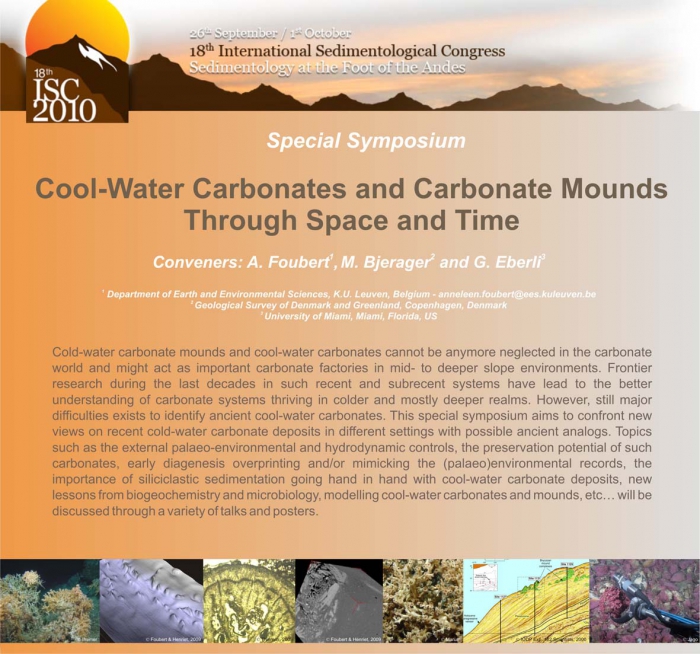

"Education at Sea – Education for the Sea"
Oostende, VLIZ, February 16-17, 2010
The Committee of Oceanology of RASAB, in cooperation with the Flanders Marine Institute (VLIZ), organizes on February 16th and 17th a workshop “Ocean School 010” which will address these questions, and to which you are cordially invited to contribute.
The workshop sessions will take the form of round tables, with short introductory statements and open discussions.
Messages from the “Ocean School 010” workshop will be conveyed to the IOC-UNESCO International conference “50 Years of Education and Awareness Raising for Shaping the Future of the Oceans and Coasts” (April 27-30, 2010, St. Petersburg), to the EurOcean 2010 Conference (Ostend) and to various concerned European and international programmes. The messages from the stakeholders and Industry will be conveyed to the master programme co-ordinators, for further attention.
For further information, please contact:
Jean-Pierre Henriet (jeanpierre.henriet@ugent.be)
Jan Seys (jan.seys@vliz.be).

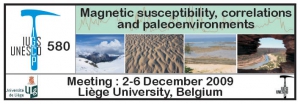 Contribution to every topic related to the application of magnetic susceptibility in paleoenvironmental studies are welcome.
Contribution to every topic related to the application of magnetic susceptibility in paleoenvironmental studies are welcome.
(IODP New Venture in Exploring Scientific Targets)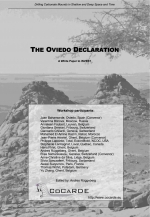
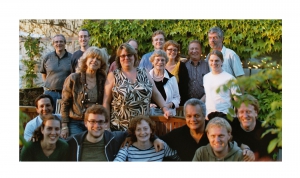 A fundamental and unanswered question facing Earth and life scientists today is, what is the relation between hydrosphere, geosphere and biosphere?
A fundamental and unanswered question facing Earth and life scientists today is, what is the relation between hydrosphere, geosphere and biosphere?
| 1. | Katja von Allmen | Organisation | University of Fribourg, Switzerland |
| 2. | Menchu Comas | CSIC and University of Granada, Spain | |
| 3. | Davy Depreiter | Renard Centre of Marine Geology, Gent University, Belgium | |
| 4. | Christian Dullo | Leibniz-Institute of Marine Sciences (IFM-GEOMAR), Germany | |
| 5. | Anneleen Foubert | Renard Centre of Marine Geology, Gent University, Belgium | |
| 6. | Tim Freudenthal | University of Bremen, MARUM, Germany | |
| 7. | Giordana Gennari | Organisation |
University of Fribourg, Switzerland |
| 8. | Dierk Hebbeln | University of Bremen, MARUM, Germany | |
| 9. | Jean-Pierre Henriet | Convenor | Renard Centre of Marine Geology, Gent University, Belgium |
| 10. | Kay Mangelsdorf | GeoForschungsZentrum (GFZ) Potsdam, Germany | |
| 11. | Stephan Margreth | Organisation | University of Fribourg, Switzerland |
| 12. | Judith A. McKenzie | ETH-Zürich, Switzerland | |
| 13. | Rory O'Donnel | University College Cork, Ireland | |
| 14. | Luis Menezes Pinheiro | Universidade de Aveiro, Portugal | |
| 15. | Hans Pirlet | Renard Centre of Marine Geology, Gent University, Belgium | |
| 16. | Andres Rüggeberg | Leibniz-Institute of Marine Sciences (IFM-GEOMAR), Germany | |
| 17. | Silvia Spezzaferri | Convenor | University of Fribourg, Switzerland |
| 18. | Mieke Thierens | University College Cork, Ireland | |
| 19. |
Crisogono Vasconcelos |
ETH-Zürich, Switzerland |
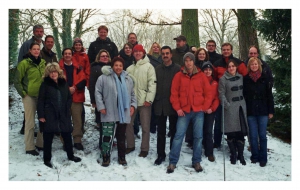 A fundamental and unanswered question facing Earth and life scientists today is, what is the relation between hydrosphere, geosphere and biosphere?
A fundamental and unanswered question facing Earth and life scientists today is, what is the relation between hydrosphere, geosphere and biosphere?
| 1. | Daniel Ariztegui | University of Geneva, Switzerland | |
| 2. | Roberto Barbieri | University of Bologna, Italy | |
| 3. | Driss Chafiki | Cadi Ayyad University, Marrakech, Morocco | |
| 4. | Menchu Comas | CSIC and University of Granada, Spain | |
| 5. | Christian Dullo | Leibniz-Institute of Marine Sciences (IFM-GEOMAR), Germany | |
| 6. | Lies De Mol | Renard Centre of Marine Geology, Gent University, Belgium | |
| 7. | Anneleen Foubert | University of Leuven, Belgium | |
| 8. | Tim Freudenthal | Convenor | University of Bremen, MARUM, Germany |
| 9. | Giordana Gennari | Organisation |
University of Fribourg, Switzerland |
| 10. | Naima Hamoumi | Mohamed V University Rabat-Agdal, Morocco | |
| 11. | Jean-Pierre Henriet | Renard Centre of Marine Geology, Gent University, Belgium | |
| 12. | Veerle Huvenne | National Oceanography Centre, Southampton, Great Britain | |
| 13. | David Jaramillo | Organisation | University of Fribourg, Switzerland |
| 14. | Cees van der Land | Royal Netherlands Institute for Sea Research, The Netherlands | |
| 15. | Stephanie Larmagnat | University of Laval, Canada | |
| 16. | Kay Mangelsdorf | GeoForschungsZentrum (GFZ) Potsdam, Germany | |
| 17. | Stephan Margreth | Organisation | University of Fribourg, Switzerland |
| 18. | Judith A. McKenzie | ETH-Zürich, Switzerland | |
| 19. | Furu Mienis | Royal Netherlands Institute for Sea Research, The Netherlands | |
| 20. | Jan Pawlowski | University of Geneva, Switzerland | |
| 21. | Luis Menezes Pinheiro | Universidade de Aveiro, Portugal | |
| 22. | Hans Pirlet | Renard Centre of Marine Geology, Gent University, Belgium | |
| 23. | Merouane Rachidi | University of Laval, Canada | |
| 24. | Jacek Raddatz | Leibniz-Institute of Marine Sciences (IFM-GEOMAR), Germany | |
| 25. | Andres Rüggeberg | Convenor | Leibniz-Institute of Marine Sciences (IFM-GEOMAR), Germany |
| 26. | Elias Samankassou | University of Geneva, Switzerland | |
| 27. | Silvia Spezzaferri | Convenor | University of Fribourg, Switzerland |
| 28. | Alina Stadniskaia |
Royal Netherlands Institute for Sea Research, The Netherlands | |
| 29. | Andre Strasser | University of Fribourg, Switzerland | |
| 30. | Stefanie Templer | ETH, Zurich, Switzerland | |
| 31. | Jürgen Titschack | University of Erlangen-Nuremberg, Germany | |
| 32. | David Van Rooij | Convenor | Renard Centre of Marine Geology, Gent University, Belgium |
| 33. | Laura Wehrmann | Max Planck Institute for Marine Microbiology, Bremen, Germany | |
| 34. |
Andrew Wheeler |
University College Cork, Ireland |
Meeting participants
| 1. | Juan Bahamonde | Convenor |
University of Oviedo, Spain |
| 2. | Valentina Blinova | MSU Moscow, Russia | |
| 3. | Anne-Christine da Silva | University of Liège | |
| 4. | Anneleen Foubert | K.U. Leuven, Belgium | |
| 5. | Giordana Gennari | University of Fribourg, Switzerland | |
| 6. | Giancarlo Ghilardi | Univesity of Geneva, Switzerland | |
| 7. | Mohamed El Amine Hazim |
University of Rabat | |
| 8. | Jean-Pierre Henriet | Convenor |
RCMG, Gent University |
| 9. | Philippe Lapointe | Total, Exxon Mobil, NCOC Houston |
|
| 10. | Stephanie Larmagnat | University of Laval, Canada | |
| 11. | Oscar A. Merino-Tomé | Instituto Geológico y Minero de España, León, Spain | |
| 12. | Hans Pirlet | RCMG, Gent University, Belgium |
|
| 13. | Andres Rüggeberg | RCMG, Gent University, Belgium |
|
| 14. | Elias Samankassou | Convenor | University of Geneva, Switzerland |
| 15. | Silvia Spezzaferri | University of Fribourg, Switzerland | |
| 16. | Alexei Suzyumov | UNESCO, Paris, France |
|
| 17. | Elisa Villa | University of Oviedo, Spain | |
| 18. | Thomas Wöhrl | Potsdam, Germany | |
| 19. |
Yu Zhang | LabMET Ghent, Belgium |